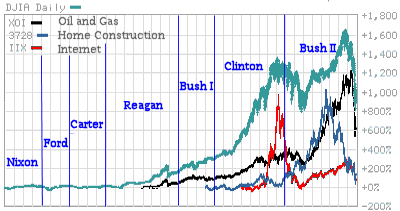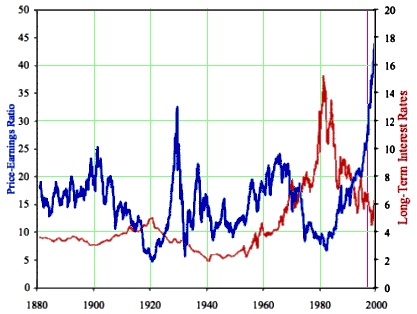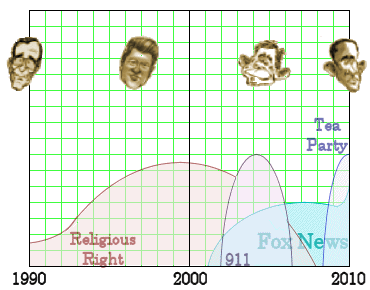I had a thought over the holidays, kind of out of the blue. "We’re in a political bubble," said my mind, apropos of nothing. Maybe it’s intuitive what my thought meant, but I thought I’d flesh it out just to see where it goes. Obviously, the "bubble" part came from all the financial bubbles that have swept through our economy in the last several decades.
| Financial Bubbles
|
|
Before the fiscal crisis in 2008, I’d never heard this term [maybe "dotcom bubble," but it didn’t register]. Technically, it’s a term applied after-the-fact to describe an asset market that becomes artificially over-valued, that then "bursts" with a crash. We’ve learned more about them in recent years than any of us ever wanted to know:
 • dotcom bubble:
The Internet as we know it came into being with the introduction of the world wide web [html] in 1994. By 1998, Internet Companies sprung up everywhere and their market values took off like rockets – mostly traded on the new NASDAQ exchange. They boosted the whole Stock Market to record heights. When that bubble burst, many companies had no assets and evaporated. The belief that sustained the dotcom bubble was that the Internet was the wave of the future. While that was no myth, most of those dotcoms were hangers-on, doomed to failure from the start. Only a few survived [Google, EBay, Amazon, Adobe etc.] – companies with solid products or services. • housing bubble:
The massive inflation of home values began around the same time as the dotcom bubble, but took longer to peak. The delusion that it was a true rise in value developed more gradually, sustained by a prolonged period of "easy money" and encouragement by the government. While the story is much more complex, the net vector was the same – a falsely inflated asset that supported the entire market which then crashed and affected us all. • oil bubble:
While less well defined, the oil bubble was also widely felt. Gas prices rose precipitously [over $4/gallon]. We saw it as something else – the sign of dwindling reserves and began to plan for the unsure future by changing our driving habits, buying hybrids, going "green." All of those things were good ideas, but the prices were actually escalated by oil speculators who manipulated the markets. When it fell, the whole market joined it. • market bubble:
In point of fact, the entire Stock Market has been a bubble of its own since 1995, tripling in value in the second half of the 1990’s and riding the crest of the other bubbles. Shiller showed that the market was overvalued in 1996 using the Price Earnings 10 year ratio, but his warning was ignored. 
Borrowing a term from an Alan Greenspan speech, Robert Shiller named his 2003 book about financial bubbles Irrational Exuberance – highlighting the almost delusional excitement that goes along with the Gold Rosh mentality that accompanies an inflating financial bubble. The thing I note about bubbles that sustains them is a seemingly rational argument that explains the rapid valuation:
"The Internet is the wave of the future."
"Real Estate has always been the best way to invest." "We’re running out of fossil fuels." |
So what would a political bubble be? It seems to me that our political scene has been very similar to our economy – prey to wave after wave of irrationality – irrationality that transcends political differences. This is not a serious attempt to chart the last 20 years – just a sketch to peg the idea:

American exceptionalism: an old idea and a new political battle
Washington Post
By Karen Tumulty
November 29, 2010Is this a great country or what?
"American exceptionalism" is a phrase that, until recently, was rarely heard outside the confines of think tanks, opinion journals and university history departments. But with Republicans and tea party activists accusing President Obama and the Democrats of turning the country toward socialism, the idea that the United States is inherently superior to the world’s other nations has become the battle cry from a new front in the ongoing culture wars. Lately, it seems to be on the lips of just about every Republican who is giving any thought to running for president in 2012.
"This reorientation away from a celebration of American exceptionalism is misguided and bankrupt," former Massachusetts governor Mitt Romney writes in his campaign setup book, "No Apology: The Case For American Greatness."
On Monday, Rep. Mike Pence (R-Ind.), who is also considering a White House bid, is scheduled to address the Detroit Economic Club on "Restoring American Exceptionalism: A Vision for Economic Growth and Prosperity."
For former Alaska governor Sarah Palin, the concept is a frequent theme in her speeches, Facebook postings, tweets and appearances on Fox News Channel. Her just-published book, "America by Heart," has a chapter titled "America the Exceptional."
Newt Gingrich, the former House speaker, contends in his speeches that Obama’s views on the subject are "truly alarming."
In an interview in August with Politico, former Arkansas governor Mike Huckabee went so far as to declare of Obama: "His worldview is dramatically different than any president, Republican or Democrat, we’ve had. . . . To deny American exceptionalism is in essence to deny the heart and soul of this nation."
And last week, Rick Santorum, the former senator from Pennsylvania, told a group of College Republicans at American University: "Don’t kid yourself with the lie. America is exceptional, and Americans are concerned that there are a group of people in Washington who don’t believe that any more"…

German Exceptionalism [1934]
Mickey — I dub thee, Sir Prophet. Remember, you read it here first.
But others are thinking that way too: A HuffPost blurb today screams out: “Top Republican Compare Boehner to Eisenhower.” Quoting from an article by Ryan Grim:
“John Boehner is Dwight Eisenhower. Eric Cantor is Omar Bradley. And Joe Barton is George Patton. That’s according to a presentation that Barton plans to give to the committee of House Republicans Tuesday that will determine whether he wins the chairmanship of the powerful Energy and Commerce Committee.
“Eisenhower, Bradley and Patton were accomplished leaders and revered generals, but they were also defined by the evil nature of their enemy, Nazi Germany. Barton, in a presentation laced with violent rhetoric, specifically refers to himself and other Republican leaders as in a “battle against the Obama administration.” Boehner is the incoming House speaker and Cantor will be elevated to minority leader.
“Speaker Boehner is our Dwight Eisenhower in the battle against the Obama Administration,” says Barton’s presentation, which was obtained by The Huffington Post.”
There is the battle line: evil Obama, compared to Hitler. GOP leaders are those brave military heroes who defeated the evil and proved American exceptionalism. Rah !! Rah !! Rah !!!